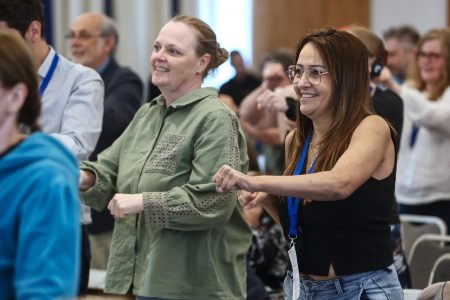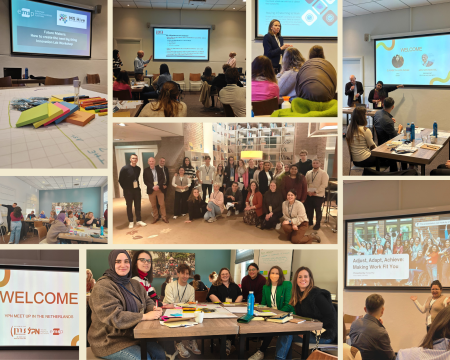
EMSP Annual Conference Day 2: Building Bridges for Inclusive MS Care Across Europe
05.06.2025posted by Kanika Kohli
The second day of the EMSP Annual Conference in Prague delivered powerful discussions on diversity, digital innovation, and the urgent need for systemic change in MS care across Europe. From groundbreaking research gaps to inspiring advocacy victories, Day 2 showcased both the challenges and opportunities ahead for the MS community.
Breaking Barriers: The Diversity Crisis in MS Research
Tania Pilz from EMSP’s Young People’s Network and Dr. Andrea Stennett from Barts Health NHS Trust opened the day with a sobering reality check: 37.8% of MS studies fail to report participant race or ethnicity, leaving vast populations underrepresented in research that shapes their care. The statistics are stark. Black people with MS face later diagnoses, receive less treatment, and experience higher rates of depression. Disease-modifying therapies may be less effective in Black patients, whilst Hispanics and Latin Americans remain significantly underrepresented in clinical trials, potentially leading to higher MS activity. Dr. Stennett shared practical solutions for creating more inclusive clinical practices, including navigator documents for newly diagnosed patients and the importance of understanding the top three languages spoken in your local area.
Envisioning Tomorrow: AI, Digital Innovation, and Prevention
A forward-looking panel featuring Anne Helme from MSIF, Juan Acosta from Roche, and Pascal Rufi from Sanofi, moderated by Jana Hlavacova, centred on earlier, more accurate diagnoses, global care equity, and therapeutic innovation beyond inflammation. EBV (Epstein-Barr Virus) emerged as a major research focus, with vaccines and antivirals in development. The panel emphasised that whilst digital biomarkers—including gait, cognitive, and mobility tracking—are being validated, AI should enhance, not replace, clinicians.
“Patients must be seen as partners, not just subjects, in clinical trials and technology innovation,” the panel stressed, highlighting concerns over data privacy, accuracy, and model bias.
Real-World Impact: National Registries and Healthcare Access
Professor Dana Horakova presented impressive data from the Czech Republic’s ReMuS registry, containing 23,391 registered patients with over 546,000 documented visits, demonstrating the power of comprehensive data collection.
Dominika Czarnota shared Poland’s experience managing 58,878 people with MS, where DMTs are fully reimbursed across 130 medical centres, though challenges persist including waiting lists and contract limitations. The influx of 1.55 million Ukrainian refugees has added complexity, meaning more MS patients than current data accounts for.
Jan Van Amstel, EMSP Treasurer and President of the Dutch MS Society, delivered inspiring advocacy victories. After the Minister of Health stopped Fampyra reimbursement in 2018, 41,000 signatures to Parliament led to reinstatement in 2020. Similarly, 50,000 signatures secured stem cell therapy reimbursement under basic health insurance in 2022, despite opposition from neurologists and insurance companies.
Empowering Patients: Knowledge as Power
Dr. Agne Straukiene provided practical guidance for managing MS symptoms, emphasising fatigue as the most common challenge. Her holistic approach included understanding your body’s energy patterns, identifying sleep problem root causes, and incorporating exercise for balance, mobility, and neuroplasticity. She advocated for Mediterranean-style eating with less red meat, stress management through meditation and nature, and staying hydrated with water rather than sugary drinks.
Janneke Knol from the Dutch MS Society reinforced patient empowerment as shared decision-making where “patient voices matter equally to professional expertise.” She encouraged symptom tracking, asking about treatment pros and cons, and taking active advocacy roles.
Global Coordination: A Prevention Revolution
Bogi Eliasen challenged current health system thinking, describing a “mindset crisis” where intervention comes too late. She advocated for systems built on precision, personalised, predictive, preventive, and participatory healthcare principles. Jan Anders Istad from the Norwegian MS Society highlighted Norway’s achievement of treatment within 21 days of diagnosis, emphasising the importance of knowing local statistics to understand rights and advocate for policy change. Anne Helme announced MSIF’s global prevention initiative, launched by MS societies in Canada and Australia, stressing that “impact comes when the MS community works together with consensus on challenges, priorities, and needs.” Professor Jelena Drulovic from the University of Belgrade shared Serbia’s comprehensive approach, including pharmacoeconomic studies covering medicines and social care, neurologist education, and established diagnosis and treatment protocols.
The conference culminated with a powerful reminder: “2.8 million people, 2.8 million faces of MS.” Each journey is individual, yet collective action is essential. The path forward requires implementing this unified approach that champions human rights, equality, social inclusion, and social protection for the MS and related disorders community across Europe. As Day 2 concluded, one message resonated clearly: the future of MS care lies not just in medical breakthroughs, but in building inclusive, data-driven systems that put patients at the centre of every decision.
EMSP’s One Million Minds Manifesto calls for a single, comprehensive, cross-sectoral strategy built on three priorities:
- Enhanced timely and affordable care delivery with high-quality rehabilitation services
- Empowering the European workforce through inclusive employment and education practices
- Incentivising data collection and research through existing EU funding programmes
 Your Account
Your Account


